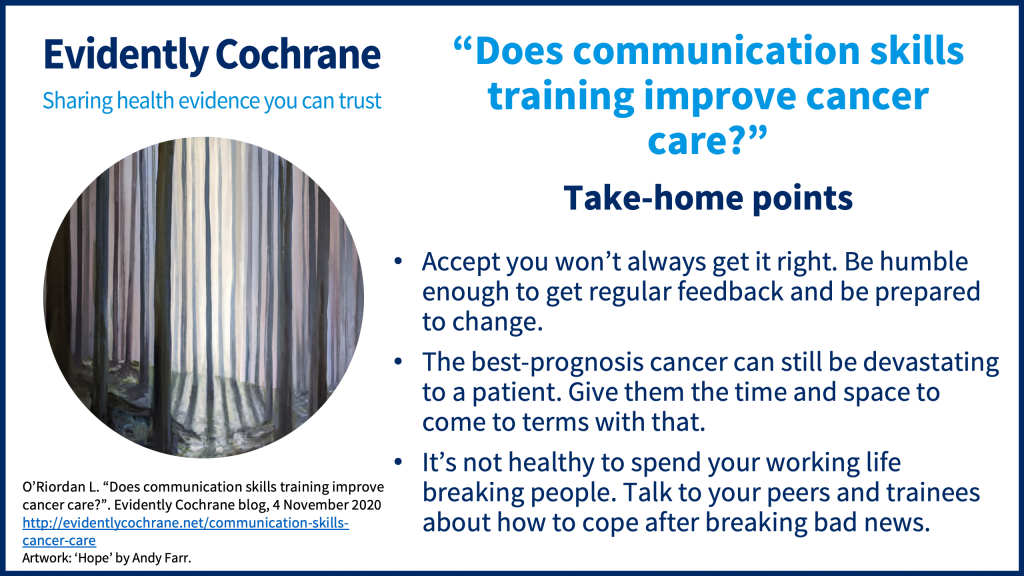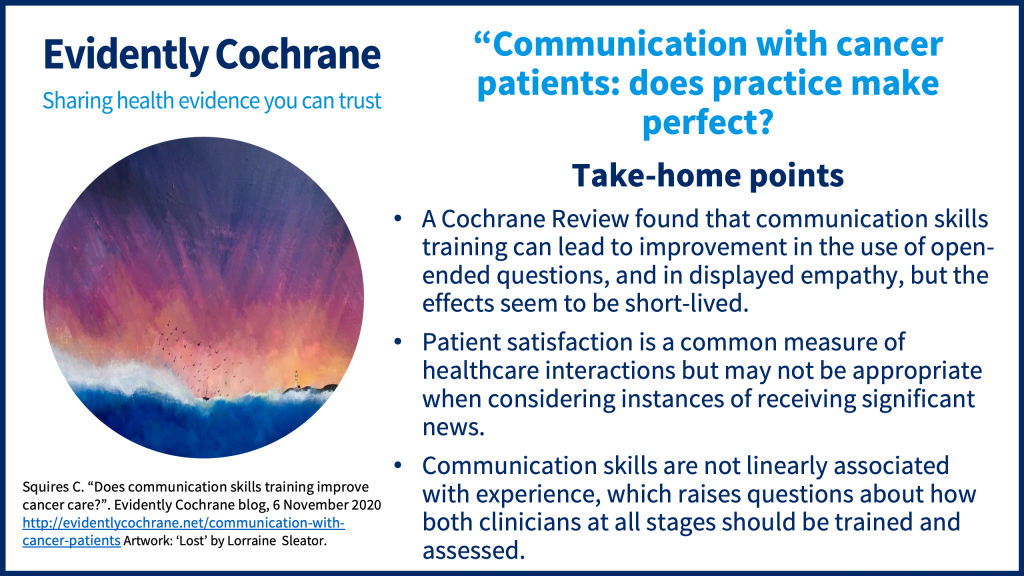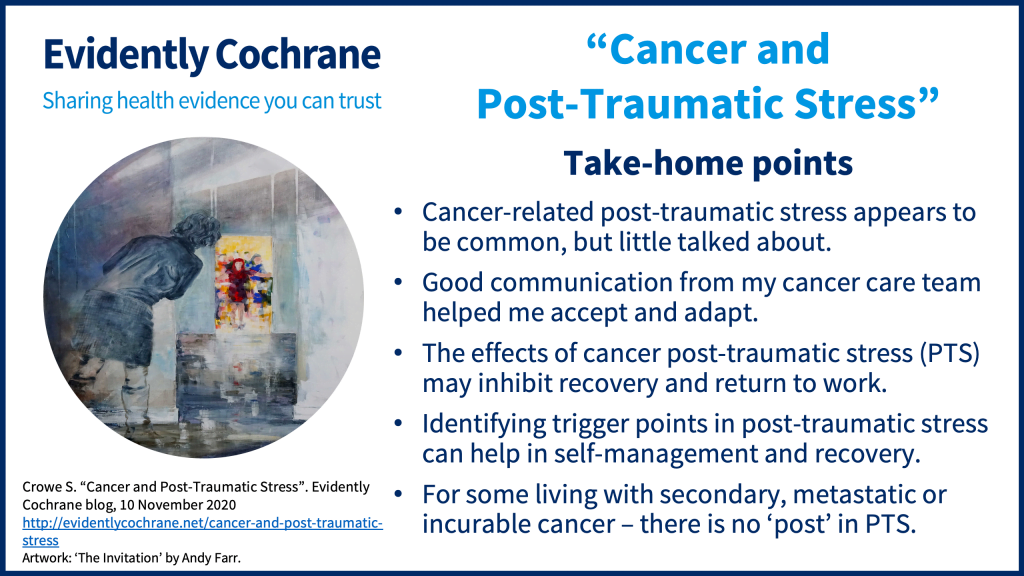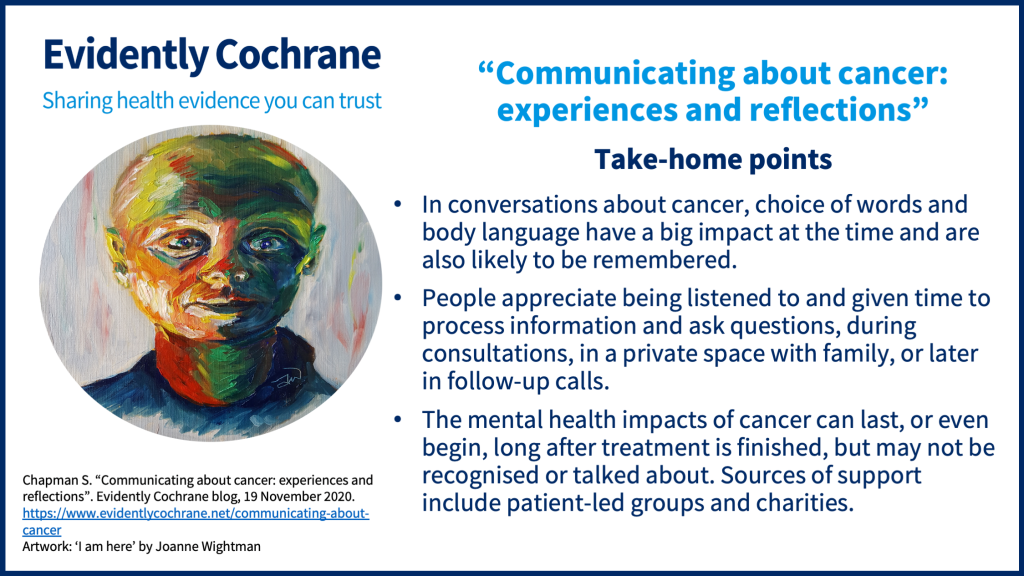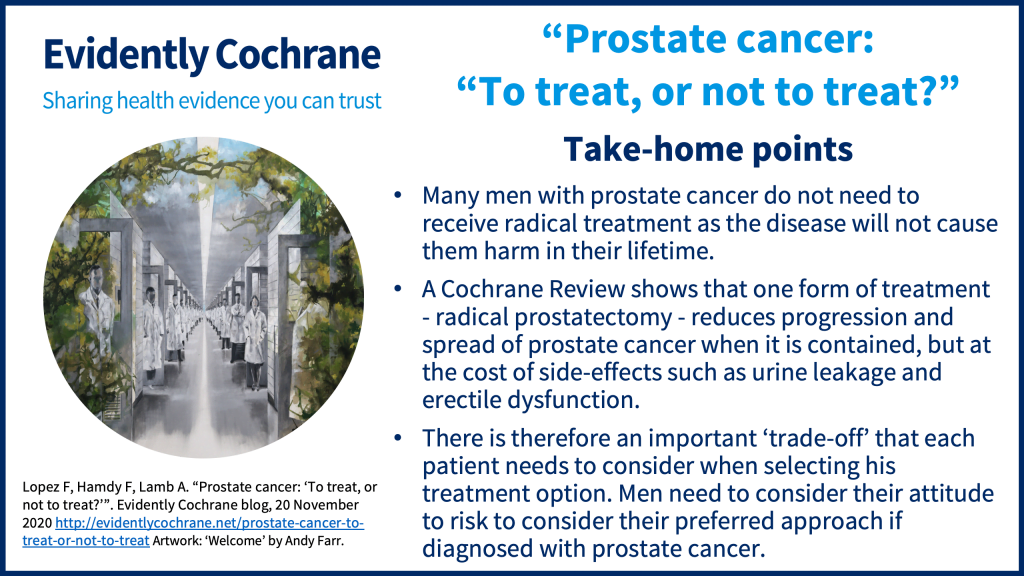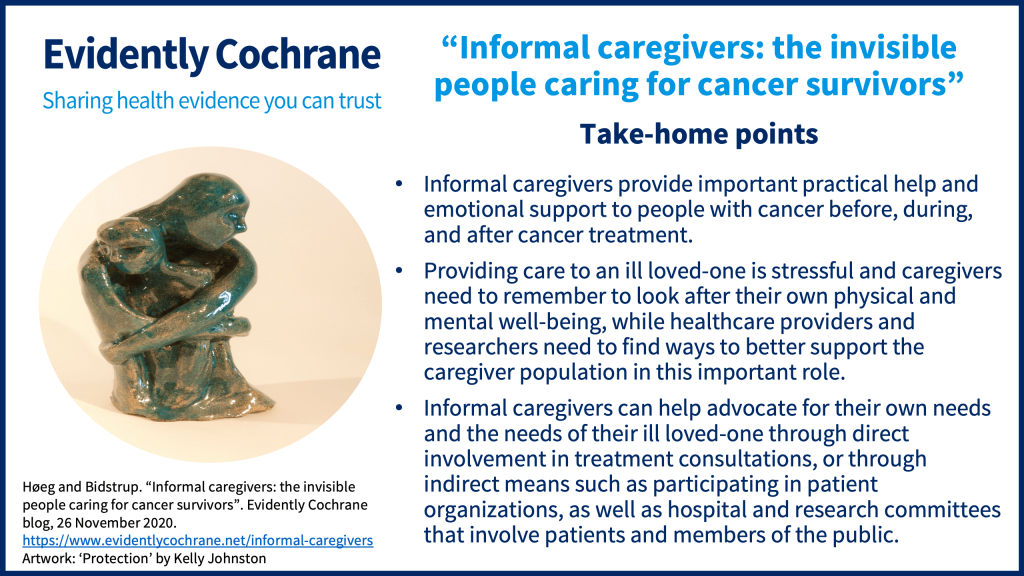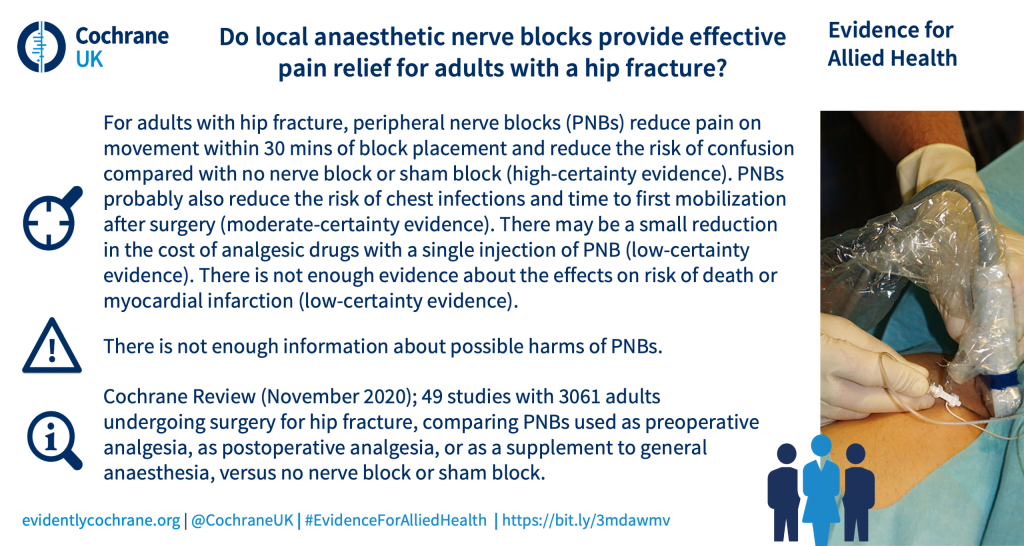The latest evidence and resources for allied health professionals and clinical support staff. You can either scroll through this page or click on any of the links below to jump to the relevant section.
Please note, unlike the rest of our blogs, our ‘Evidence for Allied Health: new evidence and resources’ blogs will not be updated.
-
-
- COVID-19
- Cancer
- Cardiovascular disease
- Critical and emergency care
- Enhanced rehabilitation for people with dementia after hip fracture
- Healthcare worker education and training
- Healthcare worker health and wellbeing
- Healthy ageing
- Mechanically-assisted walking training for children with cerebral palsy
- Myofunctional therapy for people with obstructive sleep apnoea
- Non-specific low back pain
- Palliative care
- Pelvic floor muscle training
- Perioperative care
- Regional anaesthesia
- Respiratory muscle training for people with neuromuscular disease
- Stroke
- Coming up…
-
Covid-19
COVID-19
Cochrane is producing reviews and resources for the COVID-19 pandemic. We have blogged about many of them and this blog Cochrane evidence on COVID-19: a round-up brings together a large collection of evidence and resources, starting from when this evidence was first being produced in spring 2020. Like the reviews themselves, all our blogs are updated to reflect new evidence.
Cochrane’s response to the pandemic had to meet the needs of evidence users and decision‐makers as it developed and how this is being done is discussed in an editorial COVID-19: working together and making a difference for decision-makers.
Drawing on a Cochrane Review on supporting resilience and mental well-being in frontline healthcare professionals during and after a pandemic (November 2020) there is now a brief for health systems planners and implementers. You might also be interested in the Special Collection Coronavirus (COVID-19): support for wellbeing in the healthcare workforce.
Cochrane Special Collections
Cochrane Special Collections assemble Cochrane Reviews on important topics for the prevention and treatment of COVID-19. They are developed with experts from our global Cochrane network. They are based on World Health Organization interim guidance, and continuously updated. You can find Coronavirus (COVID-19) Special Collections here.
Cochrane COVID-19 Podcasts
Cochrane COVID-19 Podcasts offer short summaries of Cochrane COVID-19 reviews from the authors themselves. A good way to hear the latest Cochrane evidence in under 5 minutes each.
Cochrane Clinical Answers
Cochrane Clinical Answers (CCAs) provide a readable, digestible, clinically-focused entry point to rigorous research from Cochrane Reviews. They are designed to be actionable and to inform point-of-care decision-making. Each CCA contains a clinical question, a short answer, and data for the outcomes from the Cochrane Review deemed most relevant to practising healthcare professionals. The evidence is displayed in a user-friendly tabulated format that includes narratives, data, and links to graphics.
You can find Cochrane Clinical Answers related to COVID-19 here.
Cancer
Don’t miss Contemplating Cancer – a special series of thought-provoking blogs in which people share personal and professional experience of cancer, along with Cochrane evidence and artwork.
Liz O’Riordan reflects on the Cochrane Review ‘Communication skills training for healthcare professionals working with people who have cancer’ from her perspective as both breast surgeon and someone with recurrent breast cancer.
Charlotte Squires reflects on the importance of communication skills for healthcare professionals working with people who have cancer, from her perspective both as doctor and a patient with advanced Hodgkin Lymphoma.
Sally Crowe reflects on her experiences of post-traumatic stress (PTS) after being diagnosed and treated for a rare cancer – a common, but little talked about outcome of having cancer.
We invited people to share their experiences and views on communicating about cancer on Twitter. In this blog, Sarah Chapman reflects on what emerged.
In this blog for people making treatment decisions about prostate cancer, surgeons Francisco Lopez, Freddie Hamdy and Alastair Lamb explore the evidence, weigh up the benefits and harms, and suggest some questions that you may wish to discuss with your clinician.
In this blog for informal cancer caregivers, Beverley Lim Høeg and Pernille Envold Bidstrup, who are both psychologists and cancer researchers, look at the challenges faced by those caring for a loved-one with cancer and explore why informal caregivers deserve more support and focus in cancer treatment and research. Pernille is also the mother of a 9 year old cancer survivor.
-
CVD
-
Cardiovascular disease
An Evidently Cochrane blog “Reducing saturated fat intake: is it worth the effort?” by Robert Walton, a Cochrane UK Senior Fellow in General Practice, looking at the evidence on reducing saturated fat in the diet to help prevent cardiovascular disease.
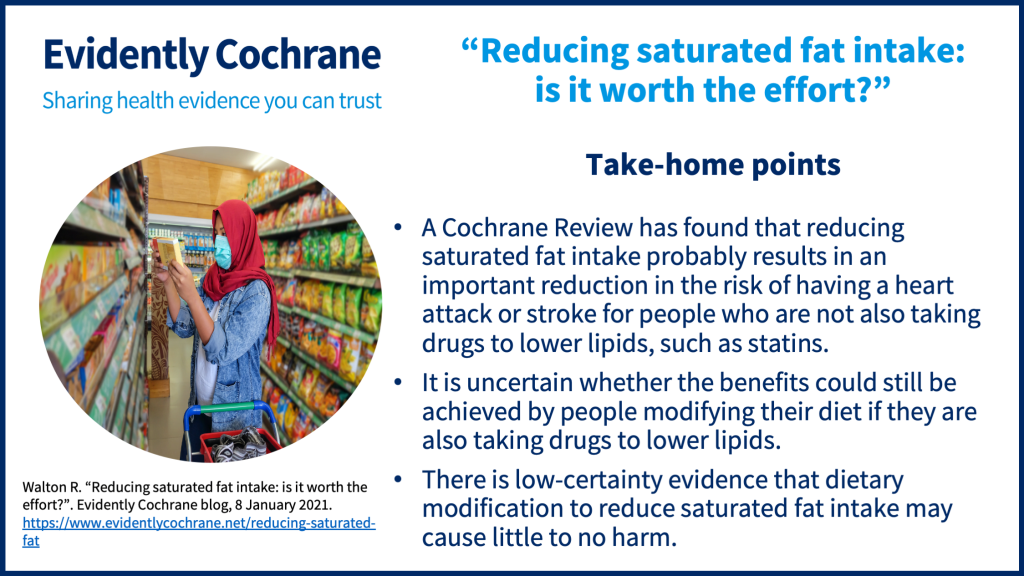
- There is a Cochrane Clinical Answer relating to the same review For people with or without cardiovascular disease (CVD), what are the effects of reducing saturated fat intake?
-
Critical & emergency care
Critical and emergency care
- Cochrane Clinical Answer: For critically ill people, do cough augmentation techniques help extubation or weaning from mechanical ventilation?
- Featured Review: Helping families secure a step‐up to emergency care for patients with a life-threatening condition
Enhanced rehab
Enhanced rehabilitation for people with dementia after hip fracture
Cochrane Clinical Answer: What are the effects of enhanced rehabilitation and care models for adults with dementia undergoing hip fracture surgery?
Healthcare worker education and training
Healthcare worker health and wellbeing
Cochrane Clinical Answer: Do psychological interventions help foster resilience among healthcare students?
Healthy ageing
The United Nations has designated 2021-2030 as the Decade of Health Ageing in an initiative that aims to bring together different sectors and countries to take action to improve the lives of older people, their families and communities.
There is a Cochrane Special Collection: Physical activity for healthy ageing.
Mechanically-assisted walking training for children with cerebral palsy
Cochrane Review: Mechanically assisted walking training for walking, participation, and quality of life in children with cerebral palsy (November 2020).
Myofunctional therapy for people with obstructive sleep apnoea
Cochrane Review: Myofunctional therapy (oropharyngeal exercises) for obstructive sleep apnoea (November 2020).
- Cochrane podcast: Myofunctional therapy (oropharyngeal – mouth and throat – exercises) for people with obstructive sleep apnoea.
Non-specific low back pain
Cochrane Clinical Answer: Is there an association between individuals’ recovery expectations and outcomes for people with non‐specific low back pain?
Palliative care
Featured Review: Hospital-based specialist palliative care for adults with a terminal illness
Pelvic floor muscle training
- Cochrane Podcast: How effective is pelvic floor muscle training undertaken during pregnancy or after birth for preventing or treating incontinence?
- Cochrane Clinical Answer: In pregnant women, does antenatal pelvic floor muscle training help to prevent urinary incontinence?
Perioperative care
- Cochrane Review: Drugs for preventing postoperative nausea and vomiting in adults after general anaesthesia: a network meta‐analysis (October 2020).
- There is a related Cochrane Podcast: Which medicines work best to prevent people from being sick (vomiting) after an operation? and a Cochrane Clinical Answer: For adults who have undergone general anaesthesia, what are the effects of postoperative antiemetic drugs?
Regional anaesthesia
- A Cochrane Review has looked at peripheral nerve blocks for hip fractures in adults (November 2020).
- Cochrane Clinical Answer: What are the effects of peripheral nerve block for people with hip fracture?
- Cochrane Special Collection: Coronavirus (COVID-19): regional anaesthesia to reduce drug use in anaesthesia and avoid aerosol generation.
Neuromuscular disease
Respiratory muscle training for people with neuromuscular disease
Cochrane Clinical Answer: For people with neuromuscular disease, what are the effects of respiratory muscle training?
Stroke
- Cochrane Stroke has some useful links relating to COVID-19 and stroke on their COVID-19 resources page.
- Cochrane Clinical Answer: For people who have had a stroke, how does electromechanically assisted training affect outcomes?
- Cochrane Clinical Answer: How does organized inpatient care compare with care on a general medical ward for people with stroke?
- Cochrane Clinical Answer: For people with stroke, how does telerehabilitation compare with usual care?
Coming up…
On 20-22 April 2021, Cochrane UK and Cochrane Ireland are holding an online event ‘Virtually Cochrane’ for all those involved with, or interested in, planning, doing, sharing and using research evidence. Registration will open in February.
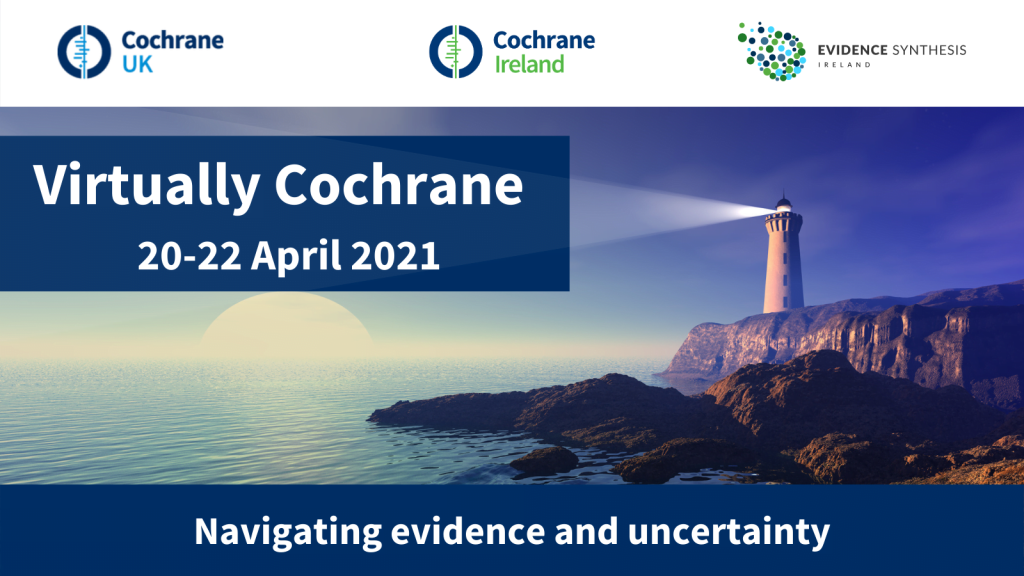
The next collection of evidence will be published here in April 2021. We may have new blogs and blogshots on individual reviews meanwhile. You can find all our blogs relevant to allied health here and blogshots here.
Join in the conversation on Twitter with @CochraneUK or leave a comment on the blog. Please note, we will not publish comments that link to commercial sites or appear to endorse commercial products. We welcome diverse views and encourage discussion but ask that comments are respectful and reserve the right to not publish comments we consider offensive.
Sarah Chapman and Selena Ryan-Vig have nothing to disclose.
-


